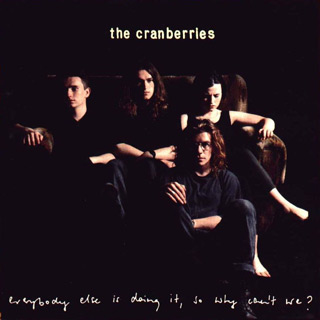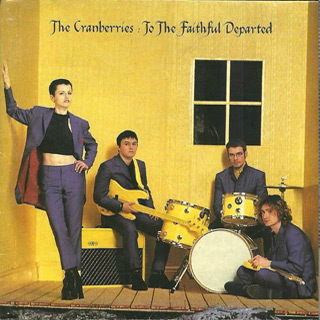Irish and international singer, songwriter and lead vocalist of the ’90s Modern Rock group The Cranberries, Dolores O’Riordan emoted and even yodelled poetic words into hauntingly beautiful sounds and soaring melodies. Tragically, this past January, her voice became silenced as family, friends, and fans were faced with the shocking and sudden news that Dolores O’Riordan had passed on.
Born Dolores Mary Eileen O’Riordan, she was only 46 years old. Raised in Ballybricken near the Irish city of Limerick, she was the youngest of seven. Her mother, Eileen, was a school caterer and her late father, Terence Patrick “Terry” O’Riordan, was a farm laborer. According to reports, prior to her passing, the singer was in London to do a short recording session. Sadly, on Monday, January 15, 2018, O’Riordan left this world.
A sudden and unexpected loss, only hours earlier, O’Riordan had reportedly left a voicemail message for a friend who described her as sounding “full of life.” Police initially said her death was “unexplained,” then ruled it as non-suspicious with no evidence of foul play. To date, no other details have been released as to her cause of death. Her friends and bandmates, The Cranberries, confirmed O’Riordan’s passing on their Facebook page saying, “Irish and International Singer Dolores O’Riordan has died suddenly in London today… Family members are devastated to hear the breaking news and have requested privacy at this very difficult time.
Tributes and condolences were expressed by fans, friends, and other fellow musicians on social media, including Hozier, Diplo, and Josh Groban. They praised O’Riordan as “inspirational” and “unforgettable.” The Kinks’ Dave Davies, who had seen her before Christmas, stated he was “shocked.” At The Pogues’ Shane MacGowan birthday jam, one day after O’Riordan’s death, Bono’s U2 closed his performance with repetitions of “Linger.” Prime Minister Leo Varadkar said she was “Limerick’s greatest ever Rock star,” and Irish President Michael D. Higgins hailed O’Riordan and the band’s “immense influence on Rock and Pop music in Ireland and internationally.” Now, all who adored O’Riordan, near and far, look to make sense of it all and reflect on the amazing talent she possessed.
Looking back, in 1989 in Limerick, Ireland, brothers Mike (bass) and Noel (guitar) Hogan formed the group The Cranberry Saw Us, with Drummer Fergal Lawler and Singer Niall Quinn. Less than a year later, Quinn left the band and the remaining members held auditions for a female singer. Fate would have it that Dolores O’Riordan came with a rough version of her song “Linger,” rightfully earning her the gig. From there, the group recorded a three-track EP, Nothing Left At All, which sold 300 copies. Changing their name to The Cranberries, their demo with the songs “Linger” and “Dreams” set off a bidding war between major record labels until the group signed with Island Records.
Although widely considered Alternative Rock, the band’s sound also incorporated Pop, Rock, and Irish Folk. By the mid 1990s, the petitely fierce O’Riordan, standing in her Doc Martens with her modern Celtic “Sean Nos” voice and occasional yodel, which she learned from her father, led the band to international success. Showing she was more than a performer and a voice, The Cranberries’ 1993 debut album, Everybody Else Is Doing It, So Why Can’t We?, was co-written entirely by O’Riordan and Guitarist Noel Hogan. An impressive start for the band, the album reached No. 1 on both the UK and Irish album charts, and featured some of the group’s biggest hits, including “Dream” and ”Linger.


Their second album, the distorted and heavier No Need to Argue, released in late 1994, became the band’s best-selling album, with 17 million copies sold worldwide. Featuring songs like “Zombie,” the group’s most-successful single to date, it was written by O’Riordan about IRA bombings that resulted in the death of two children. A striking song, it would be one of many O’Riordan and her band would record talking about serious topics such as war, family, division, and the safety of children. Not limited to political messages, The Cranberries approach never seemed forced or shoving an agenda down your throat. No, O’Riordan’s lyrics and voice reflected a pleading for happiness and hope.
An approach which earned her and The Cranberries a massive fanbase and success through the years, their mainstream success would go on to secure a total of four Top 20 albums on the Billboard 200 chart, including their debut album, No Need to Argue, 1996’s To the Faithful Departed, and 1999’s Bury the Hatchet. During that timespan, the band achieved eight Top 20 singles on the Modern Rock Tracks chart including the songs “Dreams,” “Linger,” “Ode To My Family,” “Zombie,” “When You’re Gone,” “Free To Decide,” “Just My Imagination,” and “Animal Instinct.” As of present day, the group has sold over 40 million records worldwide and their music video for “Zombie” is nearing 700 million views. Without question, all these facts make O’Riordan and The Cranberries one of the most important bands to come out of the 1990s.
Keeping their presence going strong into the new decade, in October 2001, their album Wake Up and Smell the Coffee was released and peaked at No. 46 on the Billboard 200. The following year, a greatest hits album was released, entitled Stars – The Best of 1992–2002, before the band broke up in 2003 only to reunite in 2009. During the group’s six year hiatus, O’Riordan started collaborating with other musicians and launched her solo career with two albums – Are You Listening? in 2007, followed by No Baggage in 2009 – both of which showed her ability to craft beautiful music on the highest of levels.


Fortunately for fans, in 2017 O’Riordan and The Cranberries released their seventh studio album, Something Else. An album featuring acoustic and orchestrated versions of ten of the group’s hit songs, along with three new songs recorded with the Irish Chamber Orchestra from the University of Limerick, it was a long overdue follow-up to 2012’s Rose. Adding to the excitement, The Cranberries scheduled a supporting tour for Europe, the UK, and the U.S. Unfortunately, after some European dates, the tour was cancelled due to the band citing a back problem with O’Riordan.
As mentioned, O’Riordan had a unique talent of telling a story and bringing it to life with a voice that put emphasis on each word all at the right times. From lighter songs about a first kiss to digging deeper into violence and war, O’Riordan bravely and boldy conveyed both joy and sorrow through the atmosphere of guitar distortion. Surprisingly, she started as a shy performer, often singing with her back to the audience. Possibly, in that solitude, she may have been more burdened by the darkness of depression that would surface later on. O’Riordan was said to have spent most of her adulthood balancing between depression and anorexia. Glancing at her life in pictures over the years, there are dual images that are evident; one of a smiling full-faced brunette or blonde and the other, a sullen bone-thin frowning face.
Following the end of her 20 year marriage with Don Burton, tour manager of Duran Duran, O’Riordan moved to New York, still craving to express herself in a musical sense. The move would be so she could work with former Smiths’ Bassist, Andy Rourke, and DJ Olé Koretsky, her new love interest, as a member of their Alternative Rock band D.A.R.K.. Putting out an album together, 2016’s Science Agrees, it was another dynamic venture to add to O’Riordan’s résumé. In regards to her relationship with Koretsky, following her passing, he posted, “My friend, partner, and the love of my life is gone…”


Still all so much to process, just before this Christmas, O’Riordan posted that she was “feeling good” and had done her “first bit of gigging in months.” In January, O’Riordan tweeted a picture of herself with her cat saying she was “off to Ireland.” Three days prior to her death, O’Riordan spoke with longtime bandmate, Noel Hogan, by phone about getting back to work on a tour and studio album. The day before she passed, O’Riordan had arrived in London from New York after a brief stay in Dublin. While in London, she was to meet about a second D.A.R.K. album, and was to record vocals on a version of “Zombie” for the Hard Rock band, Bad Wolves. Despite her death, Bad Wolves went on to record and release a cover of “Zombie” as a tribute to O’Riordan and donated all proceeds to her children. Their music video already has over 10 million views, proving how much fans truly miss O’Riordan
A musician, a mother of three children, a friend, and gentle soul, on Tuesday, January 23rd, hundreds of people gathered to pay tribute and say goodbye to The Cranberries’ singer at Saint Ailbe’s Catholic church in Ballybricken, where O’Riordan once sang in the local choir. Keeping her legacy going strong, this month, the remaining members of The Cranberries announced they will be releasing a new album, which the late singer had been working with them on before her untimely death.
Furthermore, the band confirmed through a statement on their website that they were planning to commemorate the 25th anniversary of their debut album Everybody Else Is Doing it So Why Can’t We with the creation of a newly remastered special 25th anniversary edition of the album and previously unreleased material for later this year. Although they had initially “put the entire project on hold,” following the singer’s passing, they “decided to finish what we started.” They will also be completing the recording of a new studio album which they began last year, and for which O’Riordan had recorded the vocals. They hope to have the new album completed and released by next year.

Despite these projects, friends, family, and fans alike will greatly miss Dolores O’Riordan now that she is gone. Which raises the question, why do so many people love her so dearly? Beyond the obvious unique talent she possessed, O’Riordan had many endearing qualities, but perhaps the most endearing was the fact that she was human. Bumped and bruised, like all of us, O’Riordan wore her emotions on her sleeve and harnessed her life of experience into gifting listeners the world over a sense of light and hope. She was not cynical, she was not bitter, and while facing her own internal struggles, she faced the world bravely and left an impression that will last a lifetime. So yes, Dolores O’Riordan is physically gone, but her voice will forever be heard in the hearts of those who loved her, and her songs will always Linger on.







No comment